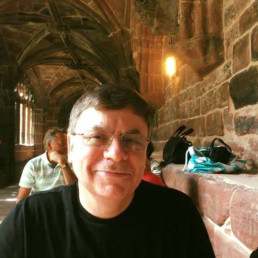
Written by Freddy Naftel
Speaker, teacher and lecturer at Holocaust Enrichment Education.
My Mother and Grandparents were refugees from Nazi Germany, my Great-Grandmother spent several years in a concentration camp and survived, my Great Aunt and Uncle both perished in Auschwitz and I have been the victim of antisemitism both at school and in my professional career as a teacher. I have experienced prejudice indirectly, whether through ignorance or genuine hatred and yet very little appears to have been done to improve matters.
Prejudice and Racism in any form is totally abhorrent and prevents society from accepting that all people are equal, regardless of their colour, creed, disability or sexual orientation. The words “Islamophobia” and “Homophobia” are by now well known but “Judeophobia” less so. Why hasn’t this expression appeared in the media alongside the aforementioned words? In any case, “phobia” means a fear of something, not necessarily hatred, even though fear stems from ignorance which can then lead to prejudice.
It is fair to say that antisemitism is thought of as a “Jewish problem” and therefore can only be fully understood and dealt with by people of that faith, which of course should not be the case. I have noticed far too often that antisemitism is pushed under the carpet and that the fault lies with Jews themselves, as if they deserve it. There are those who believe that The Holocaust was something just waiting to happen and that Jews brought it upon themselves. Others have said that Hitler failed to achieve his aim and that six million wasn’t enough. Holocaust denial has continued to grow despite overwhelming historical evidence to the contrary and conspiracy theories have doubled in recent years. The Jews have been blamed for everything including 9/11, Brexit, the Grenfell Tower tragedy and now Coronavirus and when members of a certain political party reinforced these views, antisemitism became even more prevalent.
With views like these and with little chance of the media coming to our defence, as antisemitism is not generally seen as an issue commensurate with anti-Islam or even anti-gay propaganda, we are constantly relying on organisations such as Campaign Against Antisemitism to speak up for us, often with successful results. Antisemitism is now found in academic circles, particularly at universities, where Jewish students have been made to feel unwelcome and where some lecturers have actively engaged in antisemitic rants, with the authorities seemingly unwilling to act accordingly.
This is why for the past 10 years, I have been visiting schools up and down the country, delivering presentations on Judaism, The Holocaust and Antisemitism from a very personal point of view. By necessity, I have continued delivering my talks virtually, reaching the USA and Australia in the last few months. The lack of knowledge about the true facts of The Holocaust and Antisemitism have been a revelation for many students, despite the mandatory study of this period of history in schools. It is no use skimming over the surface where this is concerned and in fact, there can never be enough Holocaust education. Many of us who study and teach about this cataclysmic event are in agreement that nothing should be hidden from young people. This is especially important when we have seen similar events occuring in countries as diverse as Rwanda, Darfur, Bosnia, Roumania and North Korea. We are now seeing the “re-education” of Uighur Muslims in Chinese concentration camps and even the Jewish way of life is threatened in China.
The way I see it, young people are our main hope and their reactions to some of the stories I relate express shock, outrage and a willingness to speak out. Students have told me that they agree that education is the way forward and they are beginning to understand that centuries of hatred have made us that much more determined to stamp down on this scourge of society.
Unfortunately, some schools believe that having a Holocaust survivor come into school once a year is sufficient enrichment for the study of The Holocaust, in effect sidestepping the growing problem of contemporary worldwide antisemitism. Yes, we should remember the experiences of those people who survived unimaginable horrors but The Holocaust itself did not necessarily teach us the right way forward, as exhibited by the actions of the aforementioned countries.
We must never forget what happened and we should do all we can to fight prejudice as a uniform body.

